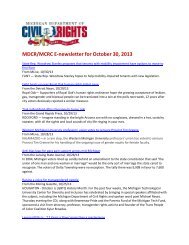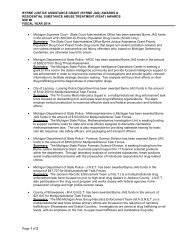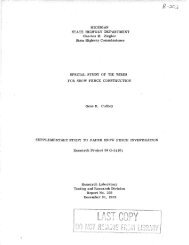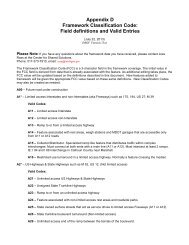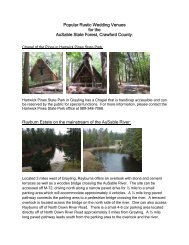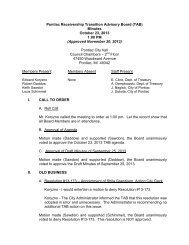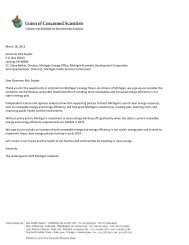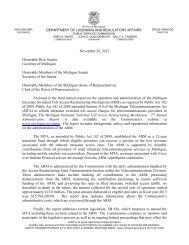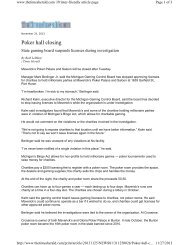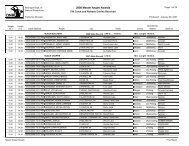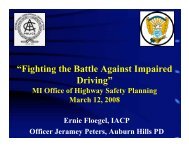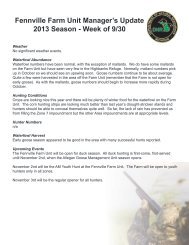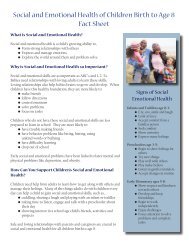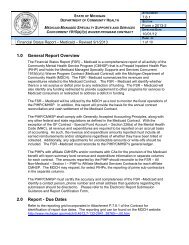You also want an ePaper? Increase the reach of your titles
YUMPU automatically turns print PDFs into web optimized ePapers that Google loves.
2005 Model Commercial Driver’s License Manual<br />
might be an air leak in the system. Controlled<br />
braking is possible only while enough air remains<br />
in the air tanks. The spring brakes will come on<br />
when the air pressure drops into the range of 20 to<br />
45 psi. A heavily loaded vehicle will take a long<br />
distance to stop because the spring brakes do not<br />
work on all axles. Lightly loaded vehicles or<br />
vehicles on slippery roads may skid out of control<br />
when the spring brakes come on. It is much safer<br />
to stop while there is enough air in the tanks to use<br />
the foot brakes.<br />
5.4.8 – Parking Brakes<br />
Any time you park, use the parking brakes, except<br />
as noted below. Pull the parking brake control<br />
knob out to apply the parking brakes, push it in to<br />
release. The control will be a yellow, diamondshaped<br />
knob labeled "parking brakes" on newer<br />
vehicles. On older vehicles, it may be a round blue<br />
knob or some other shape (including a lever that<br />
swings from side to side or up and down).<br />
Don't use the parking brakes if the brakes are very<br />
hot (from just having come down a steep grade), or<br />
if the brakes are very wet in freezing temperatures.<br />
If they are used while they are very hot, they can<br />
be damaged by the heat. If they are used in<br />
freezing temperatures when the brakes are very<br />
wet, they can freeze so the vehicle cannot move.<br />
Use wheel chocks to hold the vehicle. Let hot<br />
brakes cool before using the parking brakes. If the<br />
brakes are wet, use the brakes lightly while driving<br />
in a low gear to heat and dry them.<br />
If your vehicle does not have automatic air tank<br />
drains, drain your air tanks at the end of each<br />
working day to remove moisture and oil.<br />
Otherwise, the brakes could fail.<br />
Never leave your vehicle unattended<br />
without applying the parking brakes or<br />
chocking the wheels. Your vehicle might<br />
roll away and cause injury and damage.<br />
Subsection 5.4<br />
Test Your Knowledge<br />
1. Why should you be in the proper gear before<br />
starting down a hill?<br />
2. What factors can cause brakes to fade or<br />
fail?<br />
3. The use of brakes on a long, steep<br />
downgrade is only a supplement to the<br />
braking effect of the engine. True or False?<br />
4. If you are away from your vehicle only a short<br />
time, you do not need to use the parking<br />
brake. True or False?<br />
5. How often should you drain air tanks?<br />
6. How do you brake when you drive a tractortrailer<br />
combination with ABS?<br />
7. You still have normal brake functions if your<br />
ABS is not working. True or False?<br />
These questions may be on your test. If you can’t<br />
answer them all, re-read subsection 5.4.<br />
Page 5-10 <strong>Section</strong> 5 – Air Brakes




